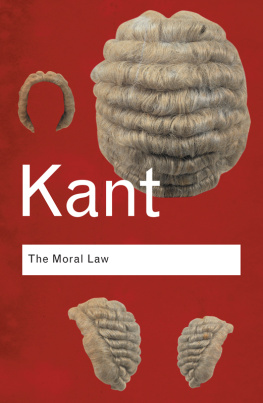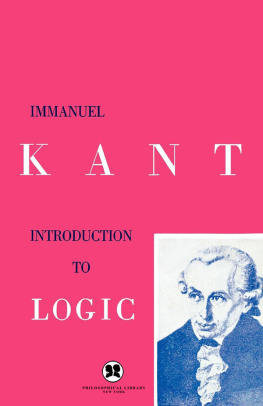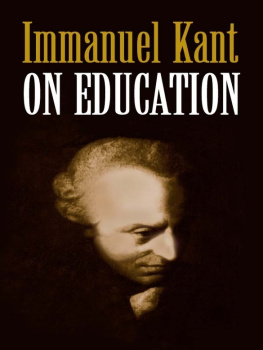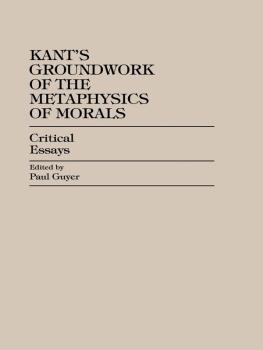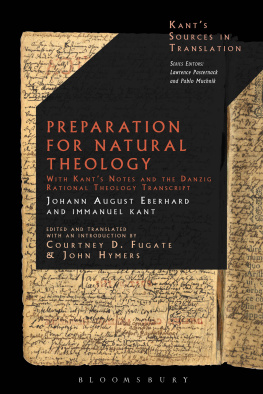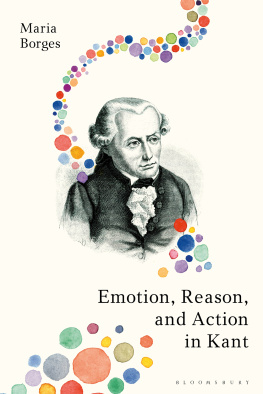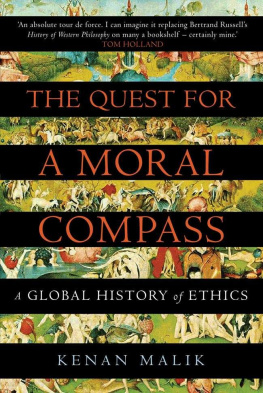The Moral Law
Fascinating reading. It seems possible that this handy edition may render a real service to social good by enabling the English reader to learn for himself the content of a philosophical classic.
Guardian

Routledge Classics contains the very best of Routledge publishing over the past century or so, books that have, by popular consent, become established as classics in their field. Drawing on a fantastic heritage of innovative writing published by Routledge and its associated imprints, this series makes available in attractive, affordable form some of the most important works of modern times.
For a complete list of titles visit
www.routledgeclassics.com
Immanuel
Kant
The Moral Law
Groundwork of the Metaphysic of Morals
Translated by H. J. Paton
With a preface, commentary and analysis by
H. J. Paton

First published 1948
by Hutchinson
First published by Routledge 1991
First published in Routledge Classics 2005
by Routledge
2 Park Square, Milton Park, Abingdon, Oxon, OX14 4RN
Simultaneously published in the USA and Canada
by Routledge
711 Third Avenue, New York, NY 10017 (8th Floor)
Routledge is an imprint of the Taylor & Francis Group, an informa business
1948 H. J. Paton
All rights reserved. No part of this book may be reprinted
or reproduced or utilised in any form or by any electronic,
mechanical, or other means, now known or hereafter
invented, including photocopying and recording, or in any information storage or retrieval system, without
permission in writing from the publishers.
British Library Cataloguing in Publication Data
A catalogue record for this book is available from the British Library
Library of Congress Cataloging in Publication Data
A catalog record for this book has been requested
ISBN10: 0415345472
ISBN13: 9780415345477
CONTENTS
TRANSLATORS PREFACE
In spite of its horrifying title Kants Groundwork of the Metaphysic of Morals is one of the small books which are truly great: it has exercised on human thought an influence almost ludicrously disproportionate to its size. In moral philosophy it ranks with the Republic of Plato and the Ethics of Aristotle; and perhapspartly no doubt through the spread of Christian ideals and through the long experience of the human race during the last two thousand yearsit shows in some respects a deeper insight even than these. Its main topicthe supreme principle of moralityis of the utmost importance to all who are not indifferent to the struggle of good against evil. Written, as it was, towards the end of the eighteenth century, it is couched in terms other than those that would be used today; but its message was never more needed than it is at present, when a somewhat arid empiricism is the prevailing fashion in philosophy. An exclusively empirical philosophy, as Kant himself argues, can have nothing to say about morality: it can only encourage us to be guided by our emotions, or at the best by an enlightened self-love, at the very time when the abyss between unregulated impulse or undiluted self-interest and moral principles has been so tragically displayed in practice. In the face of all this Kant offers us a defence of reasonableness in action: he reminds us that, however much the applications of morality may vary with varying circumstances, a good man is one who acts on the supposition that there is an unconditioned and objective moral standard holding for all men in virtue of their rationality as human beings. His claim to establish this is worth the serious consideration of all who are not content to regard themselves as victims of instinctive movements over which they have no intelligent control. Even if they do not agree with his doctrine, there is no doubt that they will see more in it the more they study it.
Unfortunately most readers in this countryand I fear even many teachers of philosophyfeel insufficiently at home in German to read this work most easily in the original. Kant has on the whole not been so fortunate in his translators as Hegel, and his English students may easily get the impression that he was a fumbler. He is very far indeed from being a fumbler, though he does expect too much from his readers: for example, he expects them to recognise at once in his long sentences the particular noun to which his excessive number of pronouns refer. I have kept in the main the structure of his sentences, which are, as it were, hewn out of the rock, but I have made no attempt to give a word for word translation. Every translation must to some extent be a veil, but it need not be an unbecoming one. I have striven to make his thought move in an English dress with some ease and evenif it were possiblewith some elegance. Contrary to the usual opinion, what has struck me most in the course of my undertaking is how well he can write. And it is my hope that through this English rendering there may loom at least something of his liveliness of mind, his suppressed intellectual excitement, his moral earnestness, his pleasure in words, and even, it may be, something of his peculiar brand of humour, which is so dry that it might have come directly out of Scotland itself.
I have prefaced my translation by an analysis of the argument, and I have also added some notes. All this, I hope, may be of help to the inexperienced reader beginning the study of moral philosophy, and I trust that those who are more advanced will forgive me if at times I appear to underline the obvious. For more serious difficulties connected with the Critical Philosophy as a whole, I must refer readers to my commentary, The Categorical Imperative, and alsoon the purely theoretical side of Kants philosophyto Kants Metaphysic of Experience.
For ease of reference and in order to facilitate grasp of the structure of the argument I have inserted into the text some cross-headings. These, in distinction from Kants own headings, are contained in square brackets. It should also be noted that Kants own parentheses are in brackets. Passages between dashes have been made parentheses by me in order to make the main line of the argument easier to follow.
In the margin the numbers from i to xiv and from 1 to 128 give the pages of the second edition, which is the best published in Kants lifetime, and I use these everywhere in my references. Unfortunately I did not use them in The Categorical Imperative, and, as they are not yet commonly accessible (though they ought to be), I have also given in the margin the pages of the edition issued by the Royal Prussian Academy in Berlin. The numbering of these pages begins with 387 so that there is no danger of confusion.
The only abbreviations I have used are T.C.I. and K.M.E. for my two books on Kant already mentioned.
I must in conclusion express my thanks to the many friends and pupils whom I have bothered on small points of translation, but especially to Dr H. W. Cassirer for assuring me that my version isor at least wasfree from howlers; to Mr W. H. Walsh for reading the proofs; and to Miss M. J. Levett, whose fierce sense of English usage has saved me from some of the Teutonisms into which a translator from the German can so easily fall. Above all I must thank my wife for typing the whole of my manuscript in these difficult days by an almost super-human effort which must surely have been inspired by the motive of duty for dutys sake.
Next page
